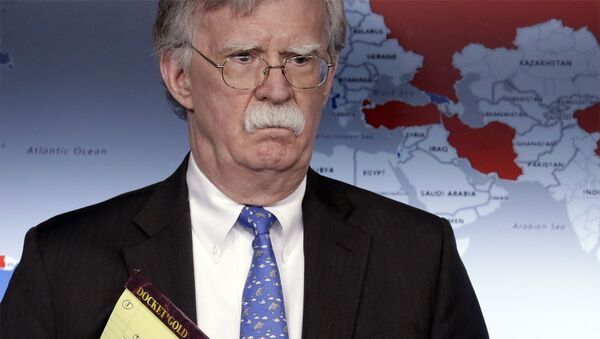The treaty expires in 2021 and the administration of US President Donald Trump reportedly remains undecided on whether to extend it, while Russia has repeatedly stressed that it is ready for dialogue.
The agreement limits the number of deployed intercontinental ballistic missiles, submarine-launched ballistic missiles, nuclear-armed bombers and nuclear warheads.
US National Security Adviser John Bolton confirmed on Wednesday that Washington will withdraw from the 1987 Intermediate-Range Nuclear Forces (INF) treaty on 2 August and claimed that the only remaining US-Russia arms control deal, the New START, was flawed and therefore unlikely to be renewed.
"This Friday will mark the official end of the INF treaty when the United States withdraws", Bolton said in his address at the 41st annual National Conservative Student Conference.
He alleged violations of the treaty by Russia, claiming that Moscow continues to develop advanced ballistic and hypersonic delivery systems while modernizing its inventory, and stressed that China continues developing intermediate-range arms while the United States has its "hands tied" by the INF.
He added that Washington was determined to negotiate both with Moscow and Beijing to achieve effective arms control.
Another nuclear agreement that Bolton touched upon in his speech was the New START, which he said was unlikely to be extended, albeit no final decision had yet been made.
"The New START nuclear agreement, which was ratified in 2010, was flawed from the beginning. It did not cover short-range tactical nuclear weapons or new Russian delivery systems. It is due to expire in February 2021, and while no decision has been made, it is unlikely to be extended. Why extend the flawed system just to say you have a treaty?" Bolton asked rhetorically.
He added that the United States is open to a new nuclear agreement that would include both Russia and China.
In February, the United States formally suspended its obligations under the INF Treaty, triggering a six-month withdrawal process that will conclude in a full withdrawal on 2 August. In July, Russian President Vladimir Putin responded by signing a decree that would suspend Russia's participation in the accord.
The INF Treaty requires the United States and Russia to eliminate and permanently forswear all of their nuclear and conventional ground-launched ballistic and cruise missiles with ranges of 500 to 5,500 kilometers (310 to 3,417 miles).
New START was signed in 2010, and is currently the only Russian-US arms control treaty. Russia has repeatedly stressed that it is open to dialogue on the future of the treaty.
Earlier in July, Russia and US top officials met in Geneva for strategic talks. According to Russian Deputy Foreign Minister Sergey Ryabkov, who led the Russian delegation, the two sides thoroughly discussed the extension of the Strategic Arms Reduction Treaty (START).
Last week, Russia and the United States held bilateral inspections within the framework of the New START, the Russian Armed Forces’ official newspaper Krasnaya Zvezda reported.
An infographic published by the outlet showed that last week Russian military personnel held four inspections abroad. Two took place in the United States in line with New START.


